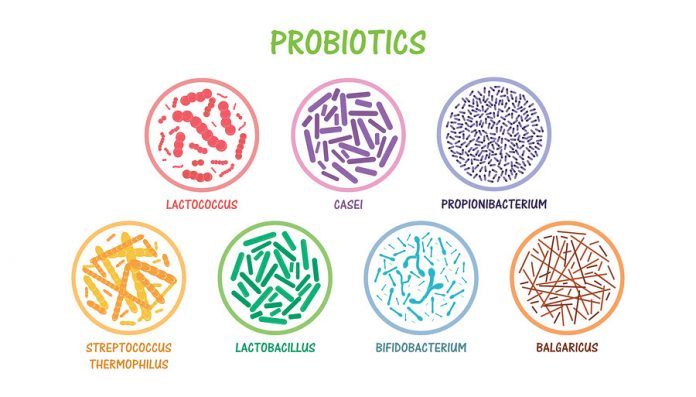Can probiotics help your immune system? Absolutely.
By now, almost everyone has heard of probiotics, the active cultures in a range of dairy products such as yogurt, some cheeses and kefir, and in fermented foods such as miso, kimchi and sauerkraut. Most of these are tasty additions to our diet that can also help improve our overall digestive health. But can they also boost the immune system?
Studies have shown that adding probiotics to your diet conveys a range of benefits for people of all ages, as well as unborn children and those who are nursing. Some of the most commonly studied strains promote T cells and the so-called natural killer cells. Some of the immune cells triggered also appear to have cancer-fighting properties.
Probiotics taken by women during pregnancy appear to affect the immune system of the unborn infant. Taken in childhood, probiotics appear to help young children avoid immune-mediated diseases such as asthma, eczema, colds, and type 1 diabetes.
The effects of probiotics are well-documented in relation to improving digestive health in a number of ways. Probiotics can balance the effects of antibiotics, which are taken in order to rid the body of bacteria.
Antibiotics can be helpful, but unfortunately they are not selective; they kill both harmful and helpful bacteria at the same time. Probiotics can add back the helpful bacteria and also boost the level of immune cells in the mucous membranes of the intestines.
In one study on probiotics, immune function, infection and inflammation in the body, probiotics stimulated a range of antibodies. Probiotics such as lactobacilli and bifidobacteria was found in children to reduce the incidence and duration of diarrhea. They can also reduce the risk of travelers’ diarrhea in adults.
The effect of certain probiotics may benefit children and adults with irritable bowel syndrome and adults with ulcerative colitis; studies with reference to probiotics’ benefits in relation to Crohn’s Disease are not clear as of yet. Probiotics have little effect in rheumatoid arthritis, but they can help with dermatitis and other allergic reactions.
Many people who are lactose intolerant might think they have to miss out on probiotics because they are so commonly found in dairy products.
The good news is that fermented foods such as miso, tempeh (fermented soy) and sauerkraut can all add healthy probiotics to your diet. And various companies these days offer dairy-free probiotic supplements.
If you have been ill lately and taking antibiotics, add some probiotics to your diet and see what a difference they can make to your health.
So – how do you choose a probiotic?
How to Choose Probiotic Supplements
Finding the right type of probiotic for your body is very important. But unfortunately it’s not as easy as you want it to be. There is a large range of probiotics, all with different ingredients and different things they do for your body. To find the right probiotic, follow these steps and tips:
1. Read the Label
It’s important to read the probiotic label so you know exactly what types of probiotics are in the product. All labels should include:
* The species and strain of the microorganisms. Many labels only include the species, but the different strains provide different benefits.
* Number of organisms in a single dose and how often you should take it. Choose one with at least seven strains and five billion colony-forming units (CFU).
* Storage information. The label needs to tell you the best storage for the probiotics. Always keep your probiotics away from heat and moisture. Some are stable at room temperature, but others require refrigeration.
* “Live and active cultures”. When buying yogurt, look for the yogurt that has this on the label. If the label doesn’t have this, the probiotic bacteria could be dead.
* Encapsulated pills ensure that the bacteria can survive through the acidity in your stomach and be able to reach your colon.
* Certification by an independent third party. The Food and Drug Administration (FDA) does not regulate most probiotics. This means that the amount of bacteria stated on the container may not be accurate. Always be sure that everything has been tested.
2. Treat Whatever Symptoms That You Have
Probiotics help with our immune systems and our digestive systems. They will help with any yeast infections you may have and any digestive problems you have come across. Look for these things in a probiotic:
* Find a probiotic with multiple strains of bacteria. This is because the gut contains 30-40 strains. The more strains, the happier and healthier you will be.
Here is a list of different health conditions that probiotics can help with:
* If you’re traveling, take the beneficial yeast probiotic saccharomyces boulardii a couple of weeks before your trip. Taking this probiotic will help prevent traveler’s diarrhea. Many people get this by digesting food or water that has been infected with bacteria.
Other probiotics helpful in diarrhea can be lactobacillus reuteri and lactobacillus rhamnosus.
* If you’re lactose intolerant, you should take lactobacillus bulgaricus. This will help the gut to digest lactose with lactase enzyme.
3. Feed and Treat Your Gut Properly
Having the right probiotics is important for your gut, but now you have to keep it healthy. The bacteria in your colon thrive on non-digestible fibers.
This is also known as prebiotics. Feed the bacteria two-four servings of garlic, bananas, artichokes, whole grains, and honey to keep your gut happy and healthy. Most probiotics already have prebiotics in them but they’ll be listed on the label as inulin.
Choosing the right probiotic for your body is very important. Probiotics have been known to get rid of any symptoms of sickness and it’s used to prevent illnesses from happening. This is one of the reasons why finding the right probiotic is so important.
Doing some research on the perfect probiotic for you ensures that you get a good quality product. If you’re ever not sure on the best probiotic for you, it’s always a good idea to check with your doctor.
Probiotics support better immune health as well as gut health. Some are more helpful for older or younger people or individuals with specific health conditions. It is worth giving a good product a try.
Background References
http://www.womansday.com/health-fitness/nutrition/advice/g1268/foods-with-probiotics/







